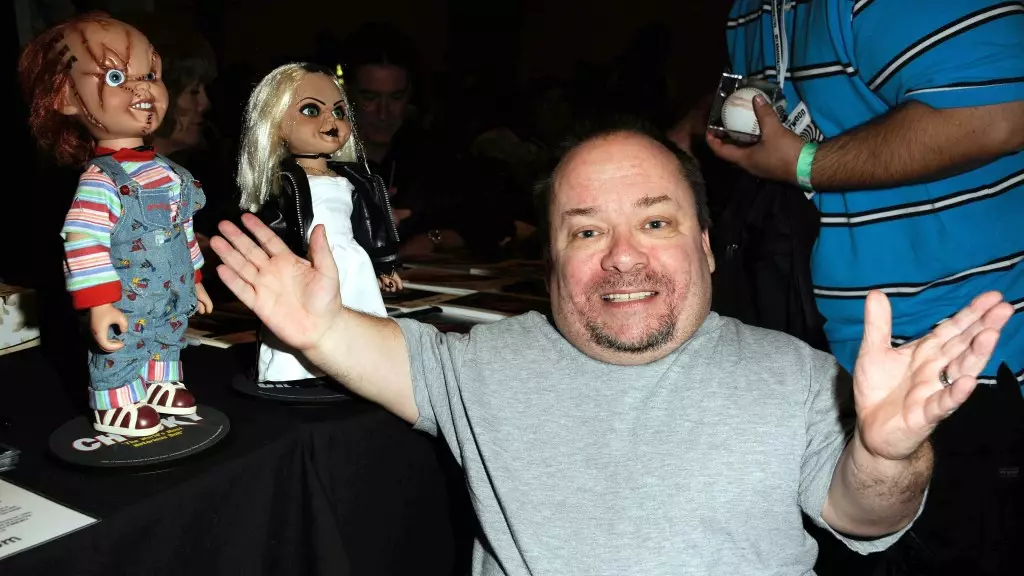The recent passing of Ed Gale, a 61-year-old actor best known for his roles in cult classics like *Howard the Duck* and *Child’s Play*, serves as a profound reminder of the duality of human experience. Gale’s life trajectory epitomizes the intricate dance between aspiration and failure, talent and misconduct. While his on-screen contributions brought him recognition and a place in the hearts of fans, the dark blemish of his alleged criminal activities clouds his legacy. A nuanced examination is necessary—can we celebrate the artist while critically addressing their faults?
In the social fabric of entertainment, the thread that binds affection for art and the acceptance of personal flaws is often tested. Many fans cherished Gale not just for his iconic performances but also for his embodiment of the “fun uncle” persona—an individual who appeared relatable, humorous, and approachable. His niece’s tribute painting him as a man who relished the simple joys of life—hot dogs with ketchup and storytelling—presents a heartwarming picture. Yet, this image contends starkly with the gravity of his recent charges. The tussle between his joyful public persona and the actions that led to his demise prompts a troubling contemplation on celebrity culture.
A Troubled End to a Colorful Life
What lingered in the air as Gale’s name transitioned from a fan-favorite actor to a subject of criminal inquiry? The contrast is jarring—one moment he is celebrated for his role in low-budget horror films, and in the next, he is implicated in a scandal that vastly overshadows his contributions. This rapid shift from beloved actor to a figure under police investigation raises critical questions about the safeguarding of minors and exploitation in entertainment.
Gale’s confirmation of soliciting a minor marks a pivotal moment that forces us to reflect on the responsibility artists hold—both in their actions and in how they inspire their audience. The entertainment industry has been rocked by a plethora of scandals, yet often it appears that fame shields its perpetrators from immediate consequences. Thus, how do we reconcile our admiration for an actor’s craft with the abhorrent nature of their personal failings?
In the end, the narrative must extend beyond mere condemnation. With every such revelation, society is presented with a teachable moment to advocate for vulnerable populations and demand accountability. Gale’s life becomes an entry point into a broader discourse concerning institutional failures that allow such behavior to go unchecked until it culminates in tragedy.
The Emotional Impact on Fans and Families
As we grapple with complex legacies, we cannot underestimate the emotional toll on the families involved. Gale’s niece attempted to paint a light-hearted picture of who he was, juxtaposing the persona he portrayed with the character he became. This complexity is relatable—many families treasure the good times spent together while still wrestling with shame over the actions of a loved one. The flurry of emotions is felt not only by those close to him but also by fans who have followed his career. They are left navigating the bittersweet taste of nostalgia for the joy his performances brought, now tainted by the revelations of his actions.
In this instance, we are reminded that superheroes invoked on film can fall drastically short of ideal ethical standards in real life. This paradox invites a deeper, more introspective inquiry into how deeply interwoven our identities become with our work. We ought to be mindful of the potential hero-worship that prompts us to overlook deeply troubling narratives.
Rethinking Our Relationship with Celebrities
As we reflect on Ed Gale’s complex legacy, it becomes crucial for us—as an audience—to reassess our relationship with celebrities. The joy they deliver through their work does not absolve them of moral responsibility. Admiration for their craft should coexist with critical scrutiny of their personal choices, paving the way for a healthier discourse around celebrity accountability.
While Gale brought smiles to countless faces, his life serves as a cautionary tale that fame can often obscure deeper issues. Engaging with this narrative can foster a more profound understanding of the complexity of human nature and the societal mechanisms that fail to protect those most at risk. In remembering Ed Gale, we must strive to engage not just with the talents he showcased, but also with the lessons highlighted by his tragic downfall. Celebrities ought to be encouraged and pressured to embody the values they profess through their art—values that, ideally, inspire a better world for all.

